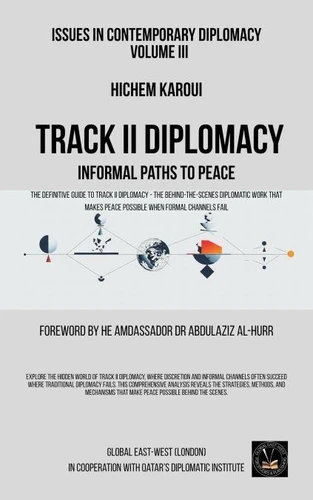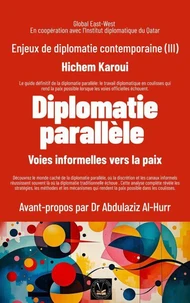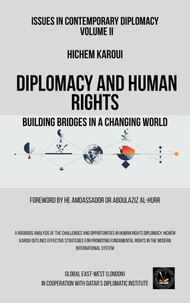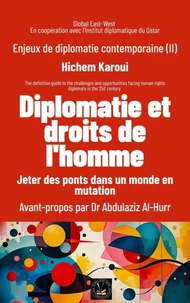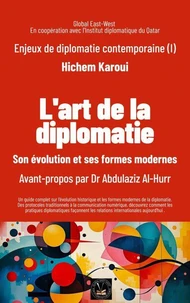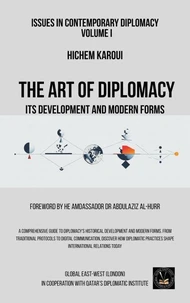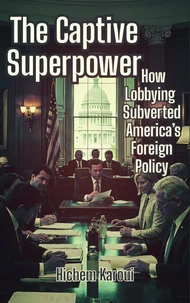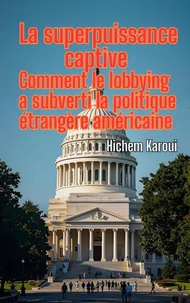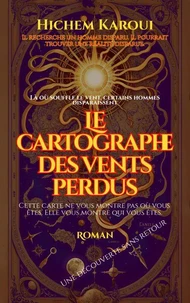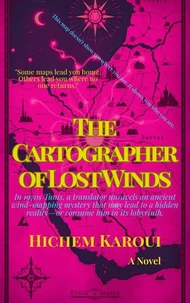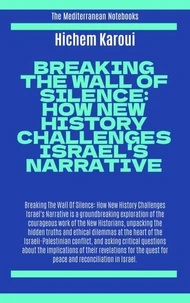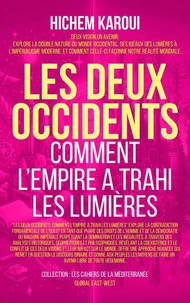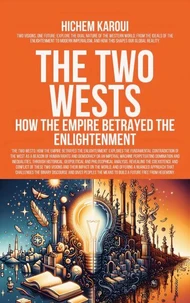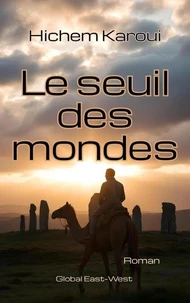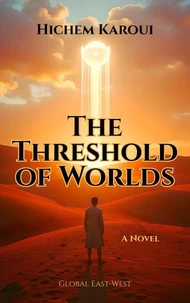Nouveauté
Issues in Contemporary Diplomacy (III): Track II Diplomacy: Informal Paths To Peace. Diplomacy
Par :Formats :
Disponible dans votre compte client Decitre ou Furet du Nord dès validation de votre commande. Le format ePub protégé est :
- Compatible avec une lecture sur My Vivlio (smartphone, tablette, ordinateur)
- Compatible avec une lecture sur liseuses Vivlio
- Pour les liseuses autres que Vivlio, vous devez utiliser le logiciel Adobe Digital Edition. Non compatible avec la lecture sur les liseuses Kindle, Remarkable et Sony
- Non compatible avec un achat hors France métropolitaine
 , qui est-ce ?
, qui est-ce ?Notre partenaire de plateforme de lecture numérique où vous retrouverez l'ensemble de vos ebooks gratuitement
Pour en savoir plus sur nos ebooks, consultez notre aide en ligne ici
- FormatePub
- ISBN8232753771
- EAN9798232753771
- Date de parution30/10/2025
- Protection num.Adobe DRM
- Infos supplémentairesepub
- ÉditeurHamza elmir
Résumé
Hichem Karoui's "Track II Diplomacy: Informal Paths To Peace" concludes the "Issues in Contemporary Diplomacy" trilogy with a rigorous, scholarly examination of non-official peace processes. This volume offers a "comprehensive and detailed analysis of the development of this type of diplomacy", providing an indispensable resource for academic libraries, think tanks, and foreign policy professionals.
The work is crucial for those who must understand diplomatic alternatives when formal avenues reach an impasse, making it a valuable addition to any serious international relations collection. The book systematically "traces the evolution of Track II from the classical era to the digital age", comparing it with traditional Track I diplomacy to highlight its unique benefits, roles, and mechanisms of action.
Karoui provides a robust theoretical framework, delving into the core strategies and methodologies that underpin successful informal negotiations, including the fundamental importance of dialogue and building trust. The analysis is supported by applied case studies that dissect both successes and failures, offering valuable "lessons learnt" for practitioners and scholars alike. Further strengthening its academic utility, the book explores contemporary factors such as the role of technology and social media in Track II processes and evaluates future prospects for this essential diplomatic tool.
It concludes with forward-looking recommendations for applying these methods to address pressing global challenges. This study is essential for postgraduate students, academics, and Ministry of Foreign Affairs employees seeking to master the full spectrum of modern diplomatic practice.
The work is crucial for those who must understand diplomatic alternatives when formal avenues reach an impasse, making it a valuable addition to any serious international relations collection. The book systematically "traces the evolution of Track II from the classical era to the digital age", comparing it with traditional Track I diplomacy to highlight its unique benefits, roles, and mechanisms of action.
Karoui provides a robust theoretical framework, delving into the core strategies and methodologies that underpin successful informal negotiations, including the fundamental importance of dialogue and building trust. The analysis is supported by applied case studies that dissect both successes and failures, offering valuable "lessons learnt" for practitioners and scholars alike. Further strengthening its academic utility, the book explores contemporary factors such as the role of technology and social media in Track II processes and evaluates future prospects for this essential diplomatic tool.
It concludes with forward-looking recommendations for applying these methods to address pressing global challenges. This study is essential for postgraduate students, academics, and Ministry of Foreign Affairs employees seeking to master the full spectrum of modern diplomatic practice.
Hichem Karoui's "Track II Diplomacy: Informal Paths To Peace" concludes the "Issues in Contemporary Diplomacy" trilogy with a rigorous, scholarly examination of non-official peace processes. This volume offers a "comprehensive and detailed analysis of the development of this type of diplomacy", providing an indispensable resource for academic libraries, think tanks, and foreign policy professionals.
The work is crucial for those who must understand diplomatic alternatives when formal avenues reach an impasse, making it a valuable addition to any serious international relations collection. The book systematically "traces the evolution of Track II from the classical era to the digital age", comparing it with traditional Track I diplomacy to highlight its unique benefits, roles, and mechanisms of action.
Karoui provides a robust theoretical framework, delving into the core strategies and methodologies that underpin successful informal negotiations, including the fundamental importance of dialogue and building trust. The analysis is supported by applied case studies that dissect both successes and failures, offering valuable "lessons learnt" for practitioners and scholars alike. Further strengthening its academic utility, the book explores contemporary factors such as the role of technology and social media in Track II processes and evaluates future prospects for this essential diplomatic tool.
It concludes with forward-looking recommendations for applying these methods to address pressing global challenges. This study is essential for postgraduate students, academics, and Ministry of Foreign Affairs employees seeking to master the full spectrum of modern diplomatic practice.
The work is crucial for those who must understand diplomatic alternatives when formal avenues reach an impasse, making it a valuable addition to any serious international relations collection. The book systematically "traces the evolution of Track II from the classical era to the digital age", comparing it with traditional Track I diplomacy to highlight its unique benefits, roles, and mechanisms of action.
Karoui provides a robust theoretical framework, delving into the core strategies and methodologies that underpin successful informal negotiations, including the fundamental importance of dialogue and building trust. The analysis is supported by applied case studies that dissect both successes and failures, offering valuable "lessons learnt" for practitioners and scholars alike. Further strengthening its academic utility, the book explores contemporary factors such as the role of technology and social media in Track II processes and evaluates future prospects for this essential diplomatic tool.
It concludes with forward-looking recommendations for applying these methods to address pressing global challenges. This study is essential for postgraduate students, academics, and Ministry of Foreign Affairs employees seeking to master the full spectrum of modern diplomatic practice.

